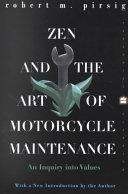Source: Zen and the Art of Motorcycle Maintenance (1974), Ch. 30
Context: The city closes in on him now, and in his strange perspective it becomes the antithesis of what he believes. The citadel not of Quality, the citadel of form and substance. Substance in the form of steel sheets and girders, substance in the form of concrete piers and roads, in the form of brick, of asphalt, of auto parts, old radios, and rails, dead carcasses of animals that once grazed the prairies. Form and substance without Quality. That is the soul of this place. Blind, huge, sinister and inhuman: seen by the light of fire flaring upward in the night from the blast furnaces in the south, through heavy coal smoke deeper and denser into the neon of BEER and PIZZA and LAUNDROMAT signs and unknown and meaningless signs along meaningless straight streets going off into other straight streets forever.
If it was all bricks and concrete, pure forms of substance, clearly and openly, he might survive. It is the little, pathetic attempts at Quality that kill.

